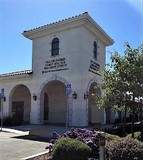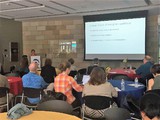California
CalAgrAbility staff attended the Ability Tools Northern California in-person meeting where they spoke to AT advocates about the partnership that is bringing farmers, farmworkers, and avid gardeners closer to AT devices through the Device Lending Library. The meeting included a presentation about BeMyEyes, an app that is connecting visually impaired communities to helpers around the world that can help them see through their smart phones. This is an application that poses the opportunity for visually impaired farmers to gain more independence in situations such as when they are searching for a tool in their shops without having to rely on their family members.
CalAgrAbility presented at the Limited Space Gardening and Accessibility Workshop in Encinitas, California. Around 30 participants attended this workshop. Staff introduced some ergonomic gardening tools as well as Ability Tools' device lending library to help attendees garden and/or farm safely. Attendees learned what the lending library had to offer as well as how to request to borrow a tool. Other presenters from other agencies, such as Master Gardeners and ANR, presented on other topics to help attendees garden and/or farm effectively and successfully.
 Staff met with human resources managers from four farms in the Salinas Valley. One of the farms is working with the Association of People Supporting Employment First (APSE) to hire individuals with disabilities. This farm currently has two employees with disabilities, and they are very open to accommodations to help their workers be successful employees. The discussion centered on modifications that can be made at farms and for farmworkers as well as challenges faced by the workers. A few miles before arriving at Soledad, staff stopped in Gonzales to share at a community health center that was in part established by a Taylor Farms donation to establish the building.
Staff met with human resources managers from four farms in the Salinas Valley. One of the farms is working with the Association of People Supporting Employment First (APSE) to hire individuals with disabilities. This farm currently has two employees with disabilities, and they are very open to accommodations to help their workers be successful employees. The discussion centered on modifications that can be made at farms and for farmworkers as well as challenges faced by the workers. A few miles before arriving at Soledad, staff stopped in Gonzales to share at a community health center that was in part established by a Taylor Farms donation to establish the building.
CalAgrAbility staff attended a seminar hosted by the Western Center for Agricultural Health. Kimberly Naffziger from Zenith presented on the Agricultural Safety and Health Council of America (ASHCA). She is the vice chair of this organization, and their mission is to proactively address ongoing and emerging occupational safety and health issues affecting U.S. agriculture. ASHCA's goals and priorities are to raise the profile of worker safety within agricultural enterprises, guide the development of effective delivery systems for safety and health information to farmers/ranchers and their workers, influence research priorities to rapidly identify best management practices for worker safety and health that maximize cost efficiency and sustainability, and pursue effective national strategies to reduce disease, injuries, and fatalities in agriculture. There are over 50 organizations, businesses, federal agencies, and safety professionals, who have the goal of improving the health and safety of ranchers, farmers, and agricultural workers.
 CalAgrAbility attended the Improving Immigrant Worker Health Symposium, a special retirement symposium to honor Dr. Marc Schenker, director of the Western Center for Agricultural Health and Safety. The event featured speakers from the California Institute for Rural Studies, the Labor Occupational Safety and Health Program, and CalOSHA.
CalAgrAbility attended the Improving Immigrant Worker Health Symposium, a special retirement symposium to honor Dr. Marc Schenker, director of the Western Center for Agricultural Health and Safety. The event featured speakers from the California Institute for Rural Studies, the Labor Occupational Safety and Health Program, and CalOSHA.
Submitted by Sara Wat
